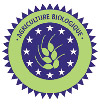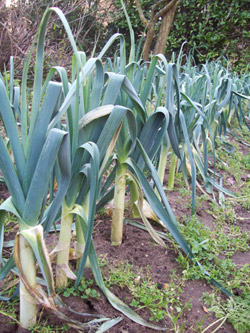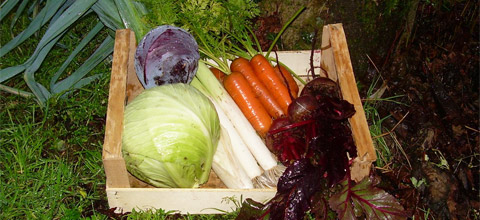What is organic food ?
Organic agriculture is a system of agricultural production that respects the environment in a general sense and is based on three fundamental principles :
• This method of cultivation respects the health of consumers by providing them with safe and controlled food.
• Adhere to the nature by a choice of varieties adapted to the local climate, by crop rotation (land in fallow) and prohibits the use of synthetic chemicals.
• It also respects the animals by offering them a so-called food “bio”, promotes the races of the terroir and prohibits the use of certain drugs (antibiotics for pigs e.g.).
So by definition, no chemical synthesis (pesticide, growth hormone, fertilizer and artificial herbicide) neither any additive synthesis (dye, flavour enhancer, synthetic sweetener) must be used in the production, processing and preservation of a biological food. It should not contain’GMOS (genetically modified organism). A bio processed product must have at least 95% of its ingredients from organic agriculture. For the 5% remaining the producer must have a derogation to prove that they are not available in “bio” (sea salt for example).
More than a trend, the bio is a sort of awareness of the dangers that brings industrial agriculture for man and nature. It's thinking about the future generation who were bequeathed our heritage by managing resources in a responsible and sustainable way.
Organic labels
Some agencies and labels have emerged to certify that a product comes from organic agriculture. See the most representative labels :
 The AB label (Organic farming) who certifies that the above conditions are met. It was created in 1985 by the Ministry of Agriculture.
The AB label (Organic farming) who certifies that the above conditions are met. It was created in 1985 by the Ministry of Agriculture.
.
 The label Nature et progrès is a private label established in 1964 which brings together producers and consumers. This label looks like the AB label but is much stricter and also covers non-food.
The label Nature et progrès is a private label established in 1964 which brings together producers and consumers. This label looks like the AB label but is much stricter and also covers non-food.
 The organic farming label (European label) is based on the same rules as the AB label while being a little less strict. In fact the presence of GMOs in the amount of 0,9% and pesticides (When there is no equivalent) are allowed. This label is not limited to food. It was created in 2000 by the European Commission.
The organic farming label (European label) is based on the same rules as the AB label while being a little less strict. In fact the presence of GMOs in the amount of 0,9% and pesticides (When there is no equivalent) are allowed. This label is not limited to food. It was created in 2000 by the European Commission.
The 100% biological is utopian
The first limit is that’It is simply unrealistic to you want to delete 100% chemical residues bio food. The environment can easily be a contaminant (a same road away, the pollution of the air and rain, the neighbouring soil poisoning are some examples). The 5% ingredients not “bio” as organic processed foods may also be contaminated. For example, sea salt that, even if it has not been processed, still could be polluted in the sea by plastics, oil or other waste all kinds.
Organic products are not more nutritious
It is undeniable that organic products are beneficial to health as are devoid, in principle (as we shall see), harmful additives for health. The taste is also, According to many people, best. This is due to the use of different varieties that are less productive (because that is not the main motivation) but tastiest. From a purely nutritional point of view, Denis Lairon, Director of research’INSERM (National Institute of health and medical research) says the levels of minerals and trace elements in the fruit and vegetables are “broadly comparable” According to the mode of production (conventional or organic). In 2009, the FSA (Food Standards Agency) in the United Kingdom, confirms this idea by stating that organic products are not nutritional benefits for calcium, iron and vitamin C, based on 162 scientific studies conducted during these 50 last years. THE AFSSA (The French food safety agency which became l’HANDLES) happens also to these conclusions in a report from 2003.
The bio is too expensive !
According to a study a year ago, in 1624 stores, l’UFC only choose deplores the increased cost of products bio. The Institute says that “In addition to the low number of products offered, It is especially the price that makes these inaccessible products” and adds that “the bio label products basket (Auchan, Leclerc, Crossroads, etc.) is 22 % more expensive than the conventional national brands basket. Worse, It is 57 % more expensive than non-organic brands distributors basket». For UFC only choose, the bio must be accessible to the greatest number and stop being a niche market. Should supermarkets to apply the same margins as to conventional products and that aid is better distributed.
It should be noted that the bio is also more expensive for other reasons. The salary reduction implies an increase of the number of people working in cultures and therefore a higher manufacturing cost. The conservation of organic products is worse because there is no specific treatment (absence of artificial preservatives, antifungal agents, etc.). Stores and supply by smaller amounts increasing once again the cost.

Leeks (bio) Garden
Food “bio” more prone to contamination
Organic foods face less treatments, such as the addition of synthetic preservatives, antifungal agents, and are therefore best for health. The other side of the coin is that they are more exposed to contamination by microbes or fungi than conventional foods. By consuming “bio” It is best to buy in small quantities and eat fresh. Anyway she that is the culture technique (organic or conventional) fruit or vegetable, vitamins disappear over time.
Organic agriculture promotes the greenhouse effect
The title is, We attach it, a provocative strand. When a farmer is converted to organic grain yield “fall of 30% 40%” According to International mail. In order to maintain the same output should therefore increase the acreage. If the bio production extends to the whole world, This would be done at the expense of the equatorial forests. Claus Felby, Professor of technology of wood and biomass of the University of Copenhagen says that the impact of organic agriculture on the climate is “a very tricky question, It is politically incorrect to talk about loud and clear. But it is a fact : the production will drop if the Denmark and the rest of Europe increases the biological cultivation. If we were only 4 billion people on the Earth, would pose no problem […] It is therefore imperative to consider, without preconceived ideas, the best way to exploit the agricultural lands of the planet”. Add that the method of the United States is through genetically modified organisms.
Some people think on the contrary that other avenues be explored and that alternatives exist. The Director of the development of the National Federation of organic farmers, Michael Tersbol, says that “the bulk of world cereal production is now used for cattle feed. Reducing meat consumption, decreases the need for fodder. Cereal production can be curbed without causing deforestation”.
The major problem of imported products
The France is important around 40% bio products (in 2009) What is an aberration when you see the farmland of our country. Import of course increases greenhouse gas emissions, with transportation, While the concept of organic is to pop-up to precisely limit the environmental impact. The France will import food from abroad while local producers sometimes produce the same products and are not some to sell their entire production. “It is absurd!” exclaimed Bonnie de Pazzis, President of the first french bio wholesaler, BioNatura. Some countries go completely against this philosophy of the bio as the Spain, for example, that literally industrialized organic and Holland that heats in winter greenhouses to grow organic tomatoes.
Even more alarming are the products “bio” imported respect any regulations. In the light of the market, many dishonest people have embarked on this lucrative industry by passing their conventional products for biological products ! ECOCERT, that is a body controlling the products of organic agriculture, a so, by a routine check, downgraded 100 tons of red fruit certified organic Serbia which had been treated with pesticides. Unfortunately, this case is not isolated. According to the’Expansion, Egyptian cucumbers, Spanish olive oil, Apples and Argentine wheat, or apricots dry Turks were “also stuffed full of pesticides”. Pink peppercorns from Madagascar sprayed with DDT toxic insecticide banned in Europe and American rice GMOs have even been imported !
According to the inspection bodies, most of the fraud come from countries outside the European Union such as the Kenya, China, the Argentina, the Chile, Israel, the Turkey, Egypt, the Madagascar etc.. The European countries are still concerned with leading the Spain and the Italy, Romania etc. (source : bioaddict.fr).
The differences that exist in the regulations of the country partly explain these derivatives. The texts are too vague and can be interpreted in different ways. In addition, the number of checks is in some countries very insufficient. ECOCERT confirms :
• In France each producer is inspected on average 1,6 twice a year (30% unannounced visits).
• In Spain the average is once a year (17% visits surprise).
• In Romania only 5% operators are controlled (5% unannounced visits).
Another factor to take into account is the fragmentation of plots that, especially in China, make that an organic farmer growing on his land may have his entire crop contaminated land of its neighbours that make conventional agriculture. Contamination may occur through the wind and rain causing pesticides, fertilizer chemical etc.
Supermarkets condemn small producers
Even if overall organic products are relatively more expensive than conventional products, There is a risk when a too high decrease of these products. We have seen that the France imports a lot of organic products. These products are purchased at low prices and can therefore be sold retail at prices defying all competition. Auchan has proposed under its own brand 50 organic certified food products less than one euro. And after l’AFP, the supermarkets sell 45% organic food What is far ahead and markets specialty stores. The risk is real for small french producers who, facing unfair competition, can no longer sell their own products. The spokesperson of the Confederation paysanne and producer of organic cereals, Philippe Collin, cares : “The large distribution will use the bio as of a product of appeal, to plump up its margins, without worrying about the social damage that it may cause” and think that organic producers will be impose in turn “prices that do not allow them to live”.
The final word
To finish, It is important to be aware of the benefits of a diet, beyond organic, more healthy and devoid of chemicals compromising our health. Focus organic products should be, with the above labels, because you'll always less fortunate, by consuming, fall food stuffed toxic additives. It must also focus on the farm products, return to healthier food and “authentic”.
The ideal would be to buy some organic food (French) in shops specialized, in the markets or join associations which, against a subscription, provide weekly baskets of organic vegetables (Jardins de Cocagne for example). You can also buy healthy foods small operators in its region (Producers in my area or Counters farmers for example) by direct sales from producers to consumers. Eating more healthily is accessible to all, just change his habits !

